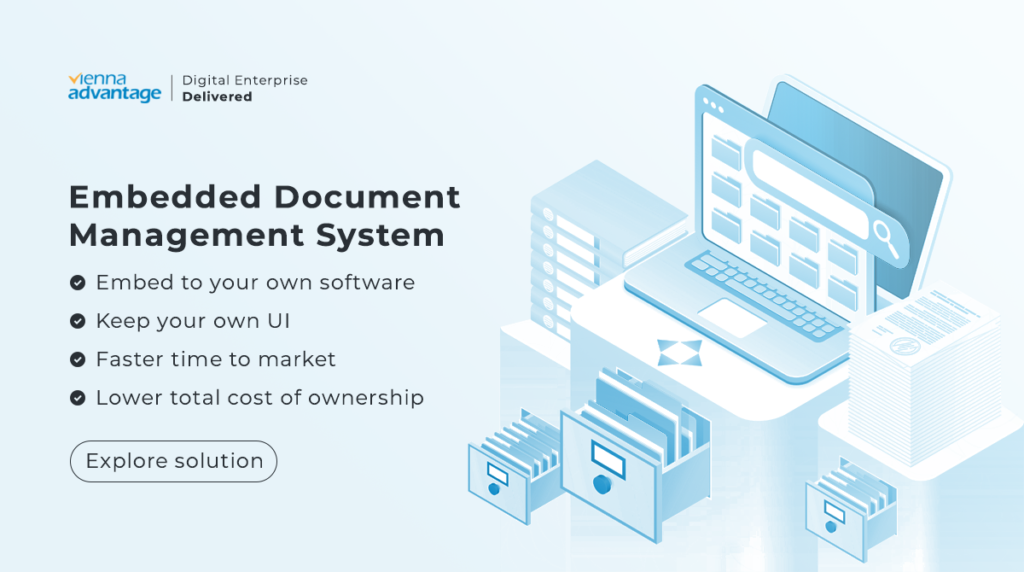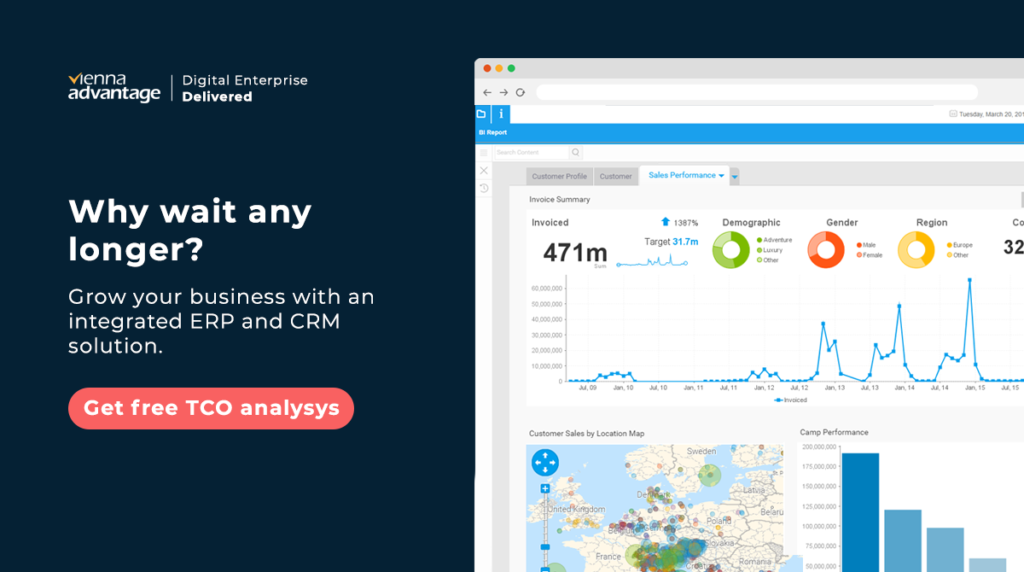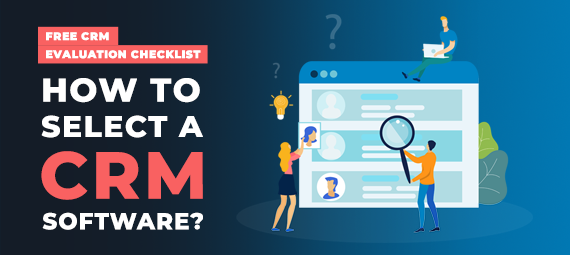How to select a CRM software? What are the right criteria when evaluating multiple CRM solutions? This article provides a free CRM evaluation checklist to help you choose the right software solution for your organization.
A Customer Relationship Management (CRM) solution is one of the most important components of your enterprise’s IT landscape. It helps your sales and marketing functions institutionalize the crucial process of attracting, acquiring and retaining customers.
This process is also highly collaborative in nature, with various stakeholders from sales, presales, and marketing jointly defining and executing a successful sales process. Keeping in mind the collaborative nature of the customer acquisition value chain, it is important that you make the right choice of your CRM solution, which has the right set of features, can be implemented easily and rapidly adopted by your sales personnel.
Free CRM evaluation checklist based on real users’ requirements and industry trends
In the last 15 years we have talked with thousands of companies and experts looking for the best CRM solution for their organization. Analyzing their requirements and following the trends in the industry, we have created a free CRM evaluation checklist to help organizations select the right solution for their business.
Follow this CRM evaluation checklist and there is a great chance that you’ll choose the right customer relationship management system for your organization.
#1 Sales Funnel Management
Depending on the kind of customers an organization serves, the sales process may vary quite dramatically across organizations. For example, the process of acquiring customers for a Direct-to-customer (D2C) brand would be very different from that of Business-to-business (B2B) companies. Businesses term this set of activities as the “sales funnel management”.
A good CRM system should be a digital twin of your sales funnel management process and should give your sales teams the ability to record deal origination and monitor the deal progress and closure. It is common practice for businesses to constantly qualify their leads and this is possible only when your CRM system is able to accurately replicate your organization’s processes as a digital twin, ensuring that key data is captured at the right time and decision makers have access to this data at all times to ensure effective utilization of their sales force.
#2 Integration Capabilities
As with every other application in your IT estate, the CRM does not operate in isolation. Because of the number of stakeholders involved in using the CRM system – from Sales to Marketing, it is important to ensure that the CRM system you select, is able to integrate seamlessly, and without extensive enhancements, with the other systems in your ecosystem. From managing contacts from disparate systems and individual users to ensuring connectivity with various communication channels, we list below the key integration scenarios that you must plan for:
- Contact Management – It is the nature of a business network that every individual in your organization may interact with external business partners in different capacities. This usually results in ill-maintained and redundant contact information across various systems. For a CRM system, the Contact Management function is the central nervous system and a robust CRM solution will be able to integrate with various applications that have the organization’s external business partners’ data and reconcile, de-duplicate and streamline contact management into a reliable source of contact data.
- Email Systems – Over the course of a deal, several employees from your organization may communicate with your leads and prospects. Majority of communication takes place via emails, and it is extremely crucial that your CRM system integrates with the organization’s email system to preserve this history of communication. Not only would this provide a single source of truth to the interaction data, but also institutionalize the interaction history to ensure consistency in communication when key personnel transition to a different role either within or outside of your organization.
- Content Management System – Organizations with focus on inbound lead generation have elaborate content strategy in place, the execution of which is managed through a content management system. For you to be able to attribute lead generation accurately to the corresponding content is crucial to continually measure the performance of your digital assets and optimize their performance. Therefore, the CRM system you choose, should be able to integrate with a Content Management System that you use.
- Telephony and Contact Centre Automation – Outbound operations are predominantly driven by telephony, whether captive or outsourced to a contact center. The CRM system of your choice should be able to integrate with various telephony services so that all outbound campaigns are driven by CRM-centric data and that the result of those outbound campaigns are accurately captured digitally in the CRM system for you to be able to process and analyze the performance of these campaigns.
#3 Campaign Management
Campaigns are an integral part of any marketing activity that directly or indirectly results in generation of leads and filing up to the top of your sales funnel. While deciding on a CRM system, you would want to evaluate various systems on their ability to define, plan and run a campaign. As the campaign runs, the CRM system should be able to link the dollar spent on it and provide a return on investment on the campaign throughout the life of a lead generated from the corresponding campaign. This means that the campaign management should be able to track the quality of leads generated through a campaign by giving your sales teams the visibility on the percentage of qualified leads and the eventual deal closures that resulted from the campaign. Additionally, the campaign planner in the CRM system should provide your marketing team with flexible options to define campaign targets – both through configurable lead characteristics and the ability to flexibly define various target lists.
#4 Embedded Document Management System and Workflow & Approval Management Engine
During the lifecycle of your CRM system, your sales and marketing personnel manage a host of documents and other media assets that relate directly to your sales and marketing activities. When you choose a CRM system for your organization, you must ensure that the solution provides for an embedded Document Management System (DMS) that is able to store documents, collaterals and other media files in the context of the CRM record. Several organizations that implemented a CRM system without an embedded DMS, ended up with their media and content data spread across a variety of applications – from emails to messaging apps – losing the ability to have an enterprise-wide single source of truth related to their CRM records.

Additionally, several organizations tend to have approval workflows related to their sales processes. These could include anything from approving a campaign budget to reviewing and approving collaterals across the team. In such situations, you should be able to configure workflows in your CRM system that routes these workflows to relevant individuals and roles within your organization and gives you complete control and auditability on these approval activities.
#5 Accurate Analytics and Reporting for Decision Making
The essence of a robust and reliable CRM system is the richness and relevance of sales and marketing analytics it can provide. It is important for you to establish the performance of prospective solutions on their reporting and analytics capabilities. For instance, your sales teams present weekly and monthly status reports to the sales leadership. A usable CRM solution should provide you the ability to create storyboards and presentations that are created directly from the underlying transactional data in your CRM system – and not have your sales personnel repetitively creating these presentations for such periodic review meetings. This not merely increases the productivity of your sales team but reduces their frustration of performing mundane repetitive tasks instead of spending that time talking to prospects.
CRM Evaluation Checklist Summary
A CRM system is often one of the most crucial parts of your enterprise IT stack and with every upgrade cycle, you should perform a thorough due diligence of available options. The result should be a Total Cost of Ownership (TCO) adjusted list of benefits so that the return on investment on the CRM system is maximized over the life of the application. As one of the leading global solution providers for progressive organizations that are willing to modernize their approach to selling and supporting systems, VIENNA Advantage provides one the most compelling solutions with all the above features and more.




